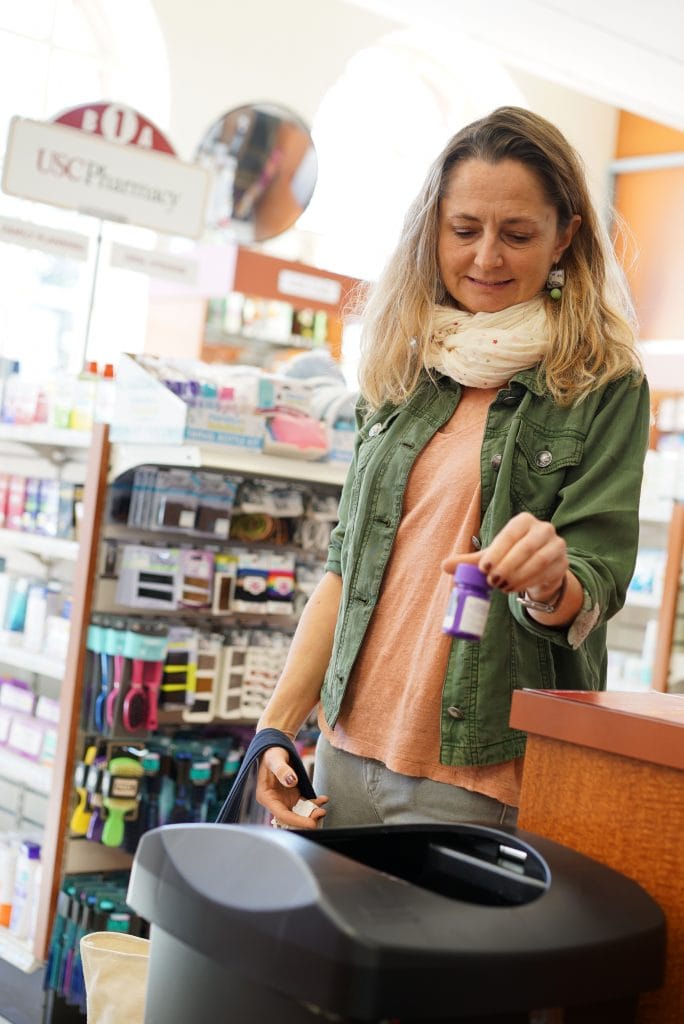The national addiction crisis has plagued the country in recent years — with the opioid epidemic grabbing headlines and driving a spike in drug overdose fatalities.
As one of the few pharmacy schools in the country that operates its own pharmacies, USC Mann was uniquely positioned to offer services and resources when USC launched a university-wide educational outreach campaign on the dangers of opioids and other drug use and abuse earlier this semester.
“Our school is committed to playing a lead role in forging a path to recovery in the midst of the opioid epidemic,” said Vassilios Papadopoulos, dean of USC Mann. “This focus is embedded in our curriculum, in our community outreach and in every aspect of our student training.”
“It’s appropriate, cost-effective and, most importantly, can save lives to have pharmacists leading this effort,” Dean Papadopoulos added. “Pharmacists are widely accessible and they’re the medication experts on the healthcare team.”
The recent outreach campaign efforts included informing Trojans about naloxone (commercially known as the nasal spray Narcan), a medication that can reverse the effects of an accidental overdose, as well as ensuring the community was aware of its availability at USC Pharmacies on campus by pharmacist consultation.
Soon after the California State Assembly’s passage in 2014 of AB 1535 — which allows pharmacists to furnish naloxone widely to those at risk of an overdose, or to their family and friends — students at USC Mann launched a Naloxone Distribution Program that has grown through a partnership with the nonprofit Homeless Health Care Los Angeles. In 2018, the program distributed more than 100 kits and garnered the university’s 2018 Tommy Community Outreach Award. Efforts at the school to combat the opioid crisis continue to expand.
USC’s inaugural Drug Take Back Day, a partnership between USC Pharmacies and USC Student Health, was held on Dec. 5 and allowed students, faculty and staff to safely turn in unused or expired medications at all USC Retail Pharmacies across the University Park Campus, Health Sciences Campus and in Glendale at the USC Verdugo Hills Professional Pharmacy.
Proper disposal of medications can protect individuals from misuse and potential overdose. It also helps protect the environment, as medications that are flushed down the drain or thrown in the garbage can enter the water supply and contaminate soil.
“Our aim in offering this service to the entire USC community is to decrease the chances of unused medications leading to accidental poisoning, misuse and overdose, and to help save lives and protect the environment,” said Raffi Svadjian, executive director of community pharmacies and assistant professor of clinical pharmacy at USC Mann.
Raffaella Ghittoni, assistant professor of biological sciences at USC Dana and David Dornsife College of Letters, Arts and Sciences, participated in Drug Take Back Day and said she had been waiting for a service like this.
“In Italy, it’s common to give unused drugs back to the pharmacy, but when I tried to take them back to pharmacies here [in California], I was told I had to bring them to the fire station,” Ghittoni said. “This is much more convenient.”
Watch a Video:
[iframe width=”900″ height=”600″ src=”https://www.youtube.com/embed/1JLXU3pqR4I” frameborder=”0″ allow=”accelerometer; autoplay; encrypted-media; gyroscope; picture-in-picture” allowfullscreen></iframe]
USC departments and student organizations who would like training from graduate students in pharmacy (on Narcan procedures in case of overdose) can contact Kari Trotter-Wall in USC Pharmacies. For peer health education on substance use harm reduction, contact USC Student Health, 213-740-9355 (WELL), studenthealth@usc.edu.


